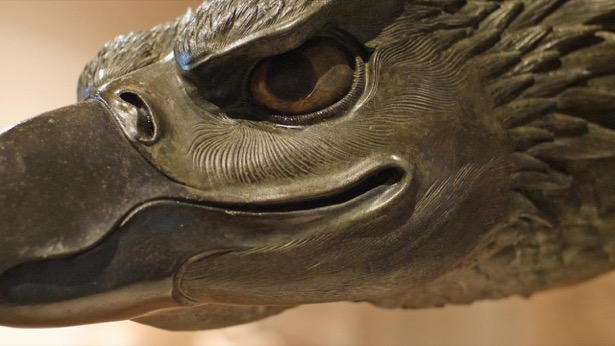Poems by Mail and a Man of Sorrows
In the 1950s the English publisher Faber & Faber had a wonderful little initiative: They offered poems in the mail by subscription. If you subscribed, you’d get one occasionally in an envelope like this:

Inside would be an illustrated poem, like this:

You may see a bigger version of that spread here. This is an idea that needs to be resurrected. Also, I wish I owned all the Ariel Poems instead of just this one.
In one of my classes I have been teaching the book of Job, and finding myself (not for the first time) surprised that this strange and even shocking book made its way into the canon of the sacred books of the Jewish and the Christian people. It’s fascinating to read the Talmudic commentary on Job: the rabbis did not know who wrote it (some thought Moses), they did not know when it was written, they did not know whether it is a piece of historical writing or a fable. All they knew was that it is a holy book. And that is a remarkable thing.
The best thing I have ever read about Job is the brief Introduction to the book by G. K. Chesterton. Here’s a taste:
When, at the end of the poem, God enters (somewhat abruptly), is struck the sudden and splendid note which makes the thing as great as it is. All the human beings through the story, and Job especially, have been asking questions of God. A more trivial poet would have made God enter in some sense or other in order to answer the questions. By a touch truly to be called inspired, when God enters, it is to ask a number of questions on His own account. In this drama of skepticism God Himself takes up the role of skeptic. He does what all the great voices defending religion have always done. He does, for instance, what Socrates did. He turns rationalism against itself. He seems to say that if it comes to asking questions, He can ask some question which will fling down and flatten out all conceivable human questioners. The poet by an exquisite intuition has made God ironically accept a kind of controversial equality with His accusers. He is willing to regard it as if it were a fair intellectual duel: “Gird up now thy loins like man; for I will demand of thee, and answer thou me” (38:3). The everlasting adopts an enormous and sardonic humility. He is quite willing to be prosecuted. He only asks for the right which every prosecuted person possesses; he asks to be allowed to cross-examine the witness for the prosecution. And He carries yet further the corrections of the legal parallel. For the first question, essentially speaking, which He asks of Job is the question that any criminal accused by Job would be most entitled to ask. He asks Job who he is. And Job, being a man of candid intellect, takes a little time to consider, and comes to the conclusion that he does not know.
STATUS BOARD
- Work: In one class, Jonathan Strange & Mr Norrell; in the other, the Tao te Ching. (We’re still in the middle of JS&MN, but last week we actually did Job in my other class — thus the note above. I got ahead of myself.)
- Music: The Clash. The only band that matters.
- Reading: I’m reading books about libraries — more about that in another post.
- Podcasts: Trying to find more good Mac/Apple podcasts, but only seven people do that kind of thing, and each of them is on five different podcasts..
- Food: Teri’s away in Alabama, so … let’s not talk about how I’m eating in her absence.
- Drink: I didn’t have super-high expectations for the new Balcones Pot Still Bourbon, but it’s amazing.
